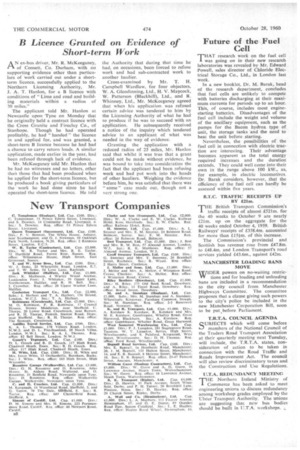B Licence Granted on Evidence of Short-term Work A N ex-bus
Page 42

If you've noticed an error in this article please click here to report it so we can fix it.
driver, Mr. R. McKeeganey, of Consett, Co. Durham, with no supporting evidence other than particulars of 'work carried out under a shortterm licence, successfully applied to the Northern Licensing Authority, Mr. J. A. T. Hanlon, for a B licence with conditions of "Lime and road and building materials within a radius of 30 miles."
The applicant told Mr. Hanlon at Newcastle upon Tyne on Monday that he originally held a contract licence with the Cross Granite and Fireclay Co., of Stanhope. Though he had operated profitably, he had " handed " the licence in and applied for, and was granted, a short-term B licence because he had had a chance to carry return loads. A similar application, made earlier in the year, had been refused through lack of evidence.
Mr. McKeeganey told Mr. Hanlon that he had no witnesses and no letters, other thah those that had been produced when he applied for the short-term licence, but he produced a book giving particulars of the work he had done since he had operated the short-term licence. He told the Authority that during that time he had, on occasions, been forced to refuse work and had sub-contracted work to another haulier.
Cross-examined by Mr. T. H. Campbell Wardlaw, for four objectors, W. A. Glendinning, Ltd., H. V. Maycock, W. Patterson (Blackhill), Ltd„ and R. Whinney, Ltd., Mr. McKeeganey agreed that when his application was refused certain advice was tendered to him by the Licensing Authority of what he had to produce if he was to succeed with an application. He subsequently received a notice of the inquiry which tendered advice to an applicant of what was needed in the way of evidence.
Granting the application with a reduced radius of 25 miles, Mr. Hanlon said that whilst it was true that a grant could not be made without evidence, he was bound to take into consideration the fact that the applicant had been refusing work and had put work into the hands of other hauliers. Weighing the evidence before him, he was satisfied that there was "some" case made out, though not a very strong one.




















































































































